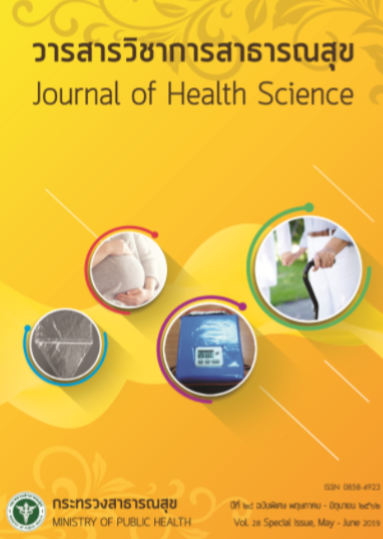Enhancing an Accessibility of Services for Mental Health Patients in Community by Applying AIC Process in the Context of Ainalai Health Promoting Hospital, Wiangsa District, Nan Province
Keywords:
enhancing model, accessibility of mental health services, AIC processAbstract
This project aimed to enhance an accessibility of services for mental health patients in community by applying AIC process in the context of the Ainalai health promoting hospital, Wiangsa district, Nan province. The participants of project consisted of 45 mental health patients and 20 patients who were chronically ill with discontinued treatment over 2 years. The project was implemented based on the participatory learning process, AIC (Appreciation-Influence-Control), which consists of an exchanging experiences, evaluation of treatment for mental health patients and registration of psychiatric patients. In addition, the project was assessed by the evaluation of daily activities and the patients’ satisfaction. Data were collected from October 2015 to September 2016; and were analyzed by using frequency, percentage and qualitative analysis. It was found that there were three problems at the begining of the project. The first aspect was on the service. The identified problems included the lack of systematic database, the unclear standard for care, and infrequent follow up of patients’ symptom. The second aspect was on the patients and their caregivers. They had low level of knowledge about mental illness and limited skills to take proper care of patients. For the third aspect, there was a lack of cooperation from the community and local organizations. After implementing the model, 95% of village health volunteers, patients and their relatives had obtained proper psychiatric knowledge and skills for coping with psychiatric problems; and among 10 patients with irregular treatment, 8 were closely follow-up and 2 were provided with directly observed treatment (DOTS). Satisfaction on the project was observed among 95% of patients and their relatives. In conclusion, the key success factors of the project were the effective coordinatiion among stakeholders, information sharing with patients and their care givers, the active roles of village health volunteers, community leaders, and networking partners from both in and out side the area. This could lead to an increase of quality, accessibility, continuity and sustainability of the services.
Downloads
Downloads
Published
How to Cite
Issue
Section
License
Copyright (c) 2019 Journal of Health Science - วารสารวิชาการสาธารณสุข

This work is licensed under a Creative Commons Attribution-NonCommercial-NoDerivatives 4.0 International License.







